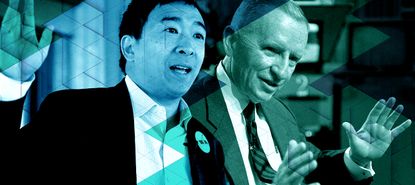Andrew Yang is Ross Perot for millennials
Yang's maverick populist wonkery is just what the Democrats need


You know how sometimes you come across something that you never thought would exist only to realize you've been dreaming of it for years without knowing it, like the amazing country album The Supremes cut in 1965? This is how I felt when I discovered the Democratic presidential candidate Andrew Yang, a.k.a. Ross Perot for millennials. It had never occurred to me that what the Democratic presidential race needed in 2020 was a soft reboot of the Texan businessman's maverick populist wonkery, but now that I know it exists I'm absolutely delighted.
Most of the 2020 Democrats have websites full of donation buttons and windy nonsense about hope and unity. You would have to go a long way to discover what, if anything, most of them have to say about public policy. Not Yang. His is the most detailed platform I have ever seen from any candidate in a primary election. It is also far and away the most interesting.
You could spend hours perusing this website. Under the "Policy" tab there is a series of headings that direct you to Yang's position on everything from tort reform to the regulation of artificial intelligence. It is certainly an eclectic range. Yang supports universal health care, the reform of the student loan industry, the implementation of a postal banking system, and free financial counseling for Americans. He wants to eliminate robo-calling and to increase public funding for the arts and local newspapers. He would like to protect children from smartphones and to pay college athletes. He argues — rightly — that the best way to ensure that wealthy people pay their fair share of taxes is to impose a VAT, something that would also help to restructure the economy so that it is not organized around endless wasteful consumption of cheap goods. He understands that it is possible to have a robust federal government that is not overly wasteful or staffed by bureaucratic layabouts. Beto O'Rourke's website, in case you're wondering, sells t-shirts.
Subscribe to The Week
Escape your echo chamber. Get the facts behind the news, plus analysis from multiple perspectives.

Sign up for The Week's Free Newsletters
From our morning news briefing to a weekly Good News Newsletter, get the best of The Week delivered directly to your inbox.
From our morning news briefing to a weekly Good News Newsletter, get the best of The Week delivered directly to your inbox.
There is more decency and common sense in some of Yang's paragraphs than I have come across in years of listening to politicians of either party. Hate fake news? Yang has proposed the creation of a "news and information ombudsman," a kind of imperial fact-checker who would award media liars heavy fines instead of pinocchios. Ever wonder what we are going to do with all the abandoned shopping malls littered across the country? Check out the page for his American Mall Act.
One of the best things Yang has going for him other than his policies is his approach to naming things. Why call the outfit that will be in charge of infrastructure projects something lame like "the Department of Infrastructure" when it could be "the Legion of Builders and Destroyers," complete with a "commander" instead of a secretary? Whatever you think of the wisdom of "universal basic income," you have to admit that "freedom dividend" is a name for it that sounds a million times cooler.
It's difficult to get a handle on what Yang's constituency is. In theory, I think his appeal could be very wide ranging. He has the usual liberal views on most of the so-called social issues, but he seems not to talk about it much, which would suit purple-state Democrats — i.e., the people both parties actually need to win in 2020 — just fine. This is only one of the many ways in which his campaign recalls that of Perot, who, probably unbeknownst to the legions of Pat Buchanan fans who defected to him in 1992, was not much of a culture warrior. They were more interested in the candidate's common-sense arguments against NAFTA and intervention in the Middle East.
At present Yang's most vocal supporters seem to be young men who are what you might call "extremely online": the same meme-addicted 4chan weirdos who tended to favor Donald Trump in 2016. They call themselves the "Yang Gang." It's clear that some of this is ironic and that it overlaps to some extent with racism and the so-called "alt right." This is not Yang's fault, but that will not prevent his opponents from attempting to use it against him if, as seems likely at this point, he appears on a debate stage with better-known Democrats later this year. I do not envy his having to disavow the anti-Semitism of @AnimeFrog334 while Kamala Harris explains that her plan for addressing income inequality is to not be mean.
What is fascinating to me about Yang is not that he has bothered to think carefully through dozens of issues that millions of ordinary Americans worry about and devise solutions to them, but the fact that none of his opponents have done so. Why do these people even want to run for president? Certainly not because they have any ideas about how they could help the rest of us.
In an earlier age when selecting a candidate was a prudential question about who was best qualified to do the same sorts of reasonable things everyone wanted for the country rather than a quasi-existential affirmation of our views about good and evil, someone like Yang would have made a great president. Reasonable people of either party should be able to see the wisdom in what he says about postal banking or vocational training in high schools or mandatory paid leave. I, for one, long for a time when they do.
Create an account with the same email registered to your subscription to unlock access.
Sign up for Today's Best Articles in your inbox
A free daily email with the biggest news stories of the day – and the best features from TheWeek.com
Matthew Walther is a national correspondent at The Week. His work has also appeared in First Things, The Spectator of London, The Catholic Herald, National Review, and other publications. He is currently writing a biography of the Rev. Montague Summers. He is also a Robert Novak Journalism Fellow.
-
 Why au pairs might become a thing of the past
Why au pairs might become a thing of the pastUnder The Radar Brexit and wage ruling are threatening the 'mutually beneficial arrangement'
By Chas Newkey-Burden, The Week UK Published
-
 'A direct, protracted war with Israel is not something Iran is equipped to fight'
'A direct, protracted war with Israel is not something Iran is equipped to fight'Instant Opinion Opinion, comment and editorials of the day
By Harold Maass, The Week US Published
-
 Today's political cartoons - April 17, 2024
Today's political cartoons - April 17, 2024Cartoons Wednesday's cartoons - political anxiety, jury sorting hat, and more
By The Week US Published
-
 Arizona court reinstates 1864 abortion ban
Arizona court reinstates 1864 abortion banSpeed Read The law makes all abortions illegal in the state except to save the mother's life
By Rafi Schwartz, The Week US Published
-
 Trump, billions richer, is selling Bibles
Trump, billions richer, is selling BiblesSpeed Read The former president is hawking a $60 "God Bless the USA Bible"
By Peter Weber, The Week US Published
-
 The debate about Biden's age and mental fitness
The debate about Biden's age and mental fitnessIn Depth Some critics argue Biden is too old to run again. Does the argument have merit?
By Grayson Quay Published
-
 How would a second Trump presidency affect Britain?
How would a second Trump presidency affect Britain?Today's Big Question Re-election of Republican frontrunner could threaten UK security, warns former head of secret service
By Harriet Marsden, The Week UK Published
-
 'Rwanda plan is less a deterrent and more a bluff'
'Rwanda plan is less a deterrent and more a bluff'Instant Opinion Opinion, comment and editorials of the day
By The Week UK Published
-
 Henry Kissinger dies aged 100: a complicated legacy?
Henry Kissinger dies aged 100: a complicated legacy?Talking Point Top US diplomat and Nobel Peace Prize winner remembered as both foreign policy genius and war criminal
By Harriet Marsden, The Week UK Last updated
-
 Trump’s rhetoric: a shift to 'straight-up Nazi talk'
Trump’s rhetoric: a shift to 'straight-up Nazi talk'Why everyone's talking about Would-be president's sinister language is backed by an incendiary policy agenda, say commentators
By The Week UK Published
-
 More covfefe: is the world ready for a second Donald Trump presidency?
More covfefe: is the world ready for a second Donald Trump presidency?Today's Big Question Republican's re-election would be a 'nightmare' scenario for Europe, Ukraine and the West
By Sorcha Bradley, The Week UK Published